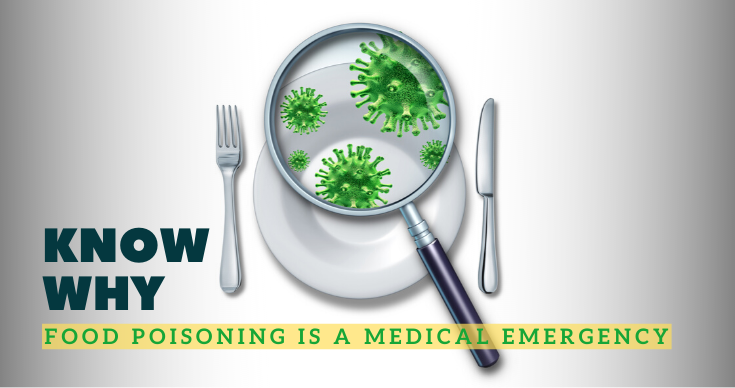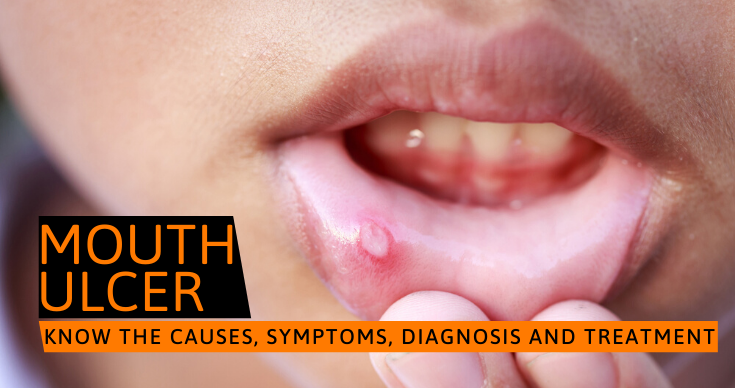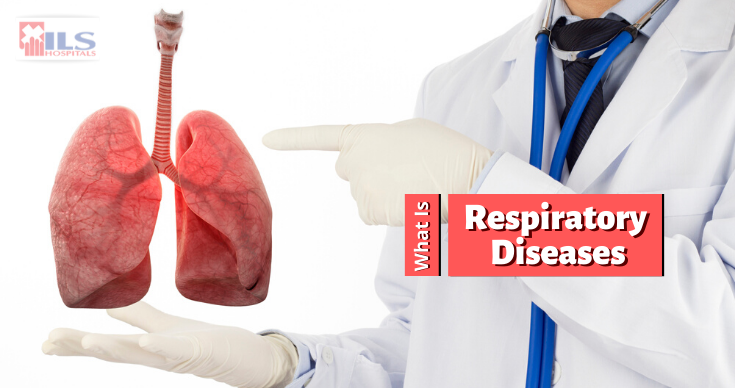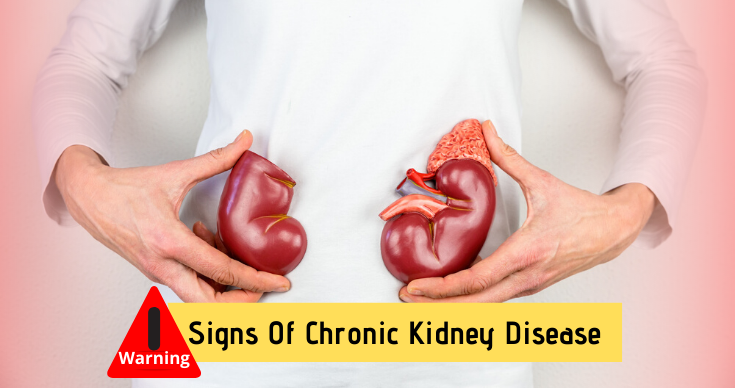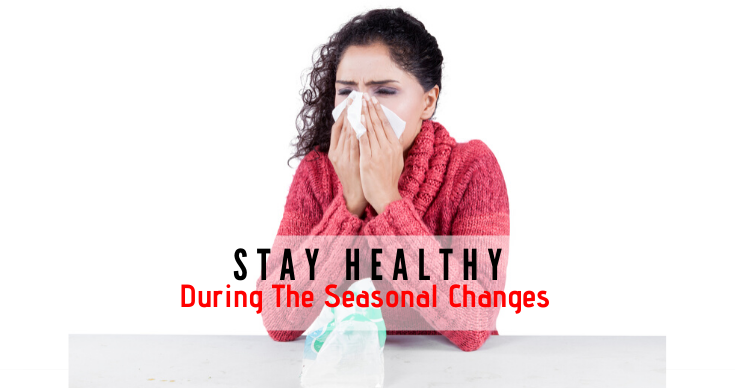What Is Food Poisoning? Is Food Poisoning A Medical Emergency?
Food nourishes our body but sometimes it can even become poisonous due to the presence of dangerous bacteria, parasites and viruses like Salmonella, E.Coli, Listeria, Trichinella, Toxoplasma, and Norovirus. Food poisoning is a common gastrointestinal condition caused by the consumption of infected or contaminated food. If left ignored, it can even become a medical emergency.
Today, ILS Hospitals would like to discuss food poisoning in brief. So, read this blog to understand more about this unpleasant medical condition.
Symptoms
There are always tell-tale symptoms of any medical condition. The symptoms of food poisoning are mentioned below:
-
Nausea and vomiting
-
Diarrhoea
-
Poor appetite
-
Abdominal cramps
-
Fever and chills.
Immediately rush to the hospital’s ER if the above symptoms persist for more than three days and when you notice severe symptoms as shown below:
-
Dehydrated body (dry mouth and no urine)
-
Blood in vomit, stool or urine
-
Dizziness and weakness
-
High fever
-
Hazy vision
-
Muscle cramps
-
Severe weakness.
Causes
Apart from certain bacteria, parasites and viruses, are there any other causes for food poisoning? Yes, the following can also cause food poisoning.
-
Eating raw or undercooked eggs, fish, chicken and other meats
-
Eating uncleaned or not properly washed fruits
-
Consuming raw and imperfectly cooked vegetables and leafy greens like cabbage, spinach, tomatoes, cauliflower, mustard greens etc.
-
Preparing food without maintaining any hygiene
-
Drinking unpasteurized milk and consuming its products
-
Having improperly stored food.
Diagnosis
The doctor will diagnose your food poisoning through physical exams and by keeping note of your medical history and present condition. In the case of food poisoning, you’ll be prescribed these primary diagnostic tests by the medical practitioner:
– Samples of the eaten food
– Blood test
– Stool test.
Treatment
Mostly, food poisoning cases solve on their own by doing the following things:
-
Sipping plenty of fluids and oral rehydration solution (ORS)
-
Eating a bland and nutritious diet
-
Avoiding spicy, fatty and oily foods
-
Eating lighter meals
-
Consuming vegetable soups and fruit juices
-
Avoiding dairy and dairy products
-
Taking plenty of rest
-
Having medicines prescribed by the medical professional.
If the condition still doesn’t get better, then it might indicate a serious medical condition. Food poisoning is surely a medical emergency if it lasts for many days and the symptoms get worse. So, always eat fresh, clean and properly cooked food. Also, ensure that the food is prepared by freshly washed hands. Come to ILS Hospitals in Kolkata or Agartala for any medical help.
Mouth Ulcer? Know The Causes, Symptoms, Diagnosis And Treatment
What is a mouth ulcer? Mouth ulcers or informally known as canker sores are white or red bruises that occur on areas like- inside the mouth, cheek, gums, tongue and even lips. We all have witnessed canker sores at some point in our lives and know how annoying and painful they can get. Generally, mouth ulcers can be self-treated but if it prolongs for, say, three and a half weeks, then it’s a serious condition and you need to get medical supervision from the hospital at that immediate moment.
Let us now know the causes behind these unbearable mouth ulcers.
-
Brushing vigorously with a hard-bristled toothbrush
-
Using toothpaste and mouth rinses containing sodium lauryl sulphate or other harsh chemicals
-
Improper oral hygiene
-
Unintentional bites inside the tongue and cheeks
-
Being allergic to certain foods like eggs, coffee, nuts, citrus foods (such as lemons, apples, tomatoes, strawberries), chocolates and so on
-
Side effects of some medicines
-
Deficiency of iron, zinc, vitamin B-12 and folate
-
Incorrect dentures or new braces
-
Infections caused by bacteria, viruses and fungi
-
Constant stress and anxiety
-
Insomnia.
The symptoms associated with mouth sores are visual and include the following:
– Swelling and redness in the affected area
– Facing difficulties while brushing teeth
– Problems in eating spicy, sour and salty foods
– Poor appetite.
Mouth ulcers are common and can get self-healed but if you frequently get them, then it becomes a problem and you should seek medical help from a good hospital or clinic.
The diagnosis is a visual exam for mouth ulcers and in case of recurring and serious mouth ulcers, other diagnostic tests are prescribed by the concerned doctor.
Here are some ways to self-treat mouth ulcers. Let’s look at them below:
-
Drink plenty of cold fluids preferably through a reusable glass straw (because environment matters too)
-
Applying a cold compress to the sore area
-
Avoid eating spicy, sour and salty foods
-
Avoid drinking too hot or cold beverages
-
Do not chew any gum
-
Gargle with warm saltwater
-
Get medically-prescribed medicines.
If you get no respite from your mouth ulcer, then visit your dentist or an ENT specialist without any excuses.
There’s no sure-fire way to prevent mouth ulcers but we can always avoid them to some extent by
– Using a soft-bristled toothbrush and a mild toothpaste
– Avoiding foods that trigger allergies
– Eating a well-balanced and nutritious diet
– Getting regular dental check-ups from a clinic or hospital.
For getting medical assistance, contact ILS Hospitals in Kolkata and Agartala.
Let’s Know Everything About Computer Vision Syndrome
Everything has pros and cons including our digital world. While the digital world has given us access to vast information and improved our lives, it surely made our eyes pay the price. Constant engagement with digital devices like computers, smartphones, tablets, and television can cause a lot of strain and eye-related problems. This is called Computer Vision Syndrome or Digital Eye Strain.
ILS Hospitals, one of the best hospitals in Kolkata, would like to enlighten everyone on this particular syndrome. Since we know the main culprit behind Computer Vision Syndrome is being engaged for prolonged periods with a computer or other digital devices generally at work , it becomes important to minimize contact or get frequent breaks for protecting the eyes. When we work on a computer, our eyes overwork due to constant focusing and refocusing, also the brightness and glare from the monitor screen affect the eye vision.
Computer Vision Syndrome does not differentiate between a person’s age. It can happen to both children and adults. Here are some more common reasons responsible for digital eye strain.
-
Using computer, smartphones, e-reader etc. in improper lighting
-
Wrong body postures
-
Untreated vision problems
-
Incorrect monitor viewing distance.
Let’s look at the symptoms of Computer Vision Syndrome.
-
Overexerted eyes or eyestrain
-
Vague or blurred vision
-
Dry eyes
-
Pain and discomfort in the eyes
-
Itchy, irritated, and red eyes
-
Headaches
-
Pain in areas like the neck, back, and shoulder.
Computer Vision Syndrome can be easily diagnosed by an ophthalmologist through an inclusive eye examination. So, is there any solution for preventing and treating Computer Vision Syndrome? Certainly yes, just look at the tips below:
1. Maintain proper posture at the workplace:
Almost a majority of people have a job that demands them to work in front of a computer. You cannot avoid the computer but can surely do things like sitting on a proper back-support chair and following minimum monitor viewing distance of 20 inches. Also, keep your back straight and sturdy.
2. Use eye protection software and apps:
Digital devices like computers and smartphones emit blue light that can even damage retinal cells so install a blue eye filter software or app in your office computer and your smartphone. You should customize the display settings of your device as well.
3. Get anti-glare computer glasses:
You should consider anti-glare computer glasses if you spend more than three hours in front of a computer.
You can always consult an eye specialist from ILS hospitals in Kolkata and Agartala to get a proper diagnosis and prescription for computer power glasses.
Discharge Instructions To Follow After A Laparoscopic Surgery
Laparoscopic surgery is a surgery in which the laparoscopic surgeons use special surgical tools and make few smaller incisions to treat a person. Laparoscopic or minimally-invasive surgery is known for its immense benefits as follows:
-
Speedy recovery
-
Less blood loss
-
No or minimal pain
-
Low chances of infection
-
No or less discomfort
-
Higher rate of success
-
Early discharge
-
Cost-effective.
After any laparoscopic surgery, the patients get certain discharge instructions from their laparoscopic surgeons. The recovery time is different for each patient, but, in general, it is much faster than traditional open surgery. Today, ILS Hospitals would like to share the general discharge instructions that need to be followed post laparoscopic surgery. So let’s look at the discharge instructions that a patient must follow post keyhole surgery for a quicker recovery.
1. Consuming a soft diet:
A bland and nutritious soft diet has to be followed after a person undergoes minimally-invasive surgery. Soft foods are good because they are digestible and aids faster recovery as your body does not have to work hard for digesting food. The food should be cooked with less oil and spices. Some of the examples can be boiled and mashed- potatoes, vegetables, rice, peeled fruits, poached eggs, strained vegetables and meat soups, fruit juices, porridge or dalia, pureed dal, lentils or masoor ki dal, and so on depending on the patient’s choice.
2. Avoiding certain foods:
Some foods should be avoided or else they may delay the patient’s recovery. Some of them are fried and oily foods, fatty foods (like red meat), spicy foods, and stale foods as they may cause indigestion, heartburn, and acidity. Also, there’s no question of eating roadside and outside food, so home-cooked food is your only good companion.
3. Taking medications on time:
No matter wherever you go, when it comes to timely medications, doctors from different hospitals are on the same page.
4. Avoiding overstrenuous activities:
It is important to not overexert the body post any surgery. The incisional site is still raw and not completely healed, so all sorts of vigorous activities (outdoor sports, running, moving furniture, carrying heavy weights, climbing stairs, jumping etc.) need to be postponed for some time.
5. Taking care of the incisional region:
The incision, even though minute, must be taken care of by keeping it clean, dry and safe. Do not scrub, scratch and disturb the surgical incisions site and wear loose-fitting comfortable clothes. Never expose the surgical site to sunlight.
After any laparoscopic or minimally-invasive procedure, please get proper discharge instructions from your doctor or medical professional for better recovery. You can get your laparoscopic treatment done from experienced laparoscopic surgeons at ILS Hospitals in Kolkata and Agartala.
Do You Know These 4 Common Respiratory Diseases? Know Now
Pulmonology is a branch of medical science that deals with issues associated with the respiratory tract.
We live in a polluted world, so getting diseases that affect the respiratory system is an unsurprising reality. ILS Hospitals would like to introduce some common respiratory diseases so that people can recognize the symptoms and seek medical advice on time. 4 common respiratory diseases are disclosed below:
1. Asthma:
Asthma is a chronic respiratory disease where the bronchial tubes become inflamed and produce more than natural mucus. It is a disease that can only be controlled by following the doctor’s advice. Asthma attacks can be deadly so it is advisable for patients with asthma to always keep the inhaler sprays with them wherever they go. The symptoms related to asthma are as follows:
-
Shortness of breath
-
Wheezing
-
Chest discomfort
-
Coughing.
2. Pulmonary Tuberculosis:
Pulmonary tuberculosis is a communicable lung infection and an airborne disease caused by the bacteria, Mycobacterium tuberculosis.
To know the symptoms of this infectious disease, please read the below points:
-
Cough that lasts for more than two weeks
-
Difficult breathing
-
Involuntary weight loss
-
Chest pain
-
Anorexia or loss of appetite
-
Fever and chills
-
Night sweats
-
Haemoptysis (blood in the sputum).
3. Chronic Bronchitis:
Another common COPD (Chronic Obstructive Pulmonary Disease) is Chronic Bronchitis. This disease and its symptoms are similar to asthma, but bronchitis is caused by certain viruses and pollutants. Here are some symptoms of chronic bronchitis.
-
Shortness of breath
-
Discomfort in chest
-
Chronic cough
-
Wheezing
-
Sore throat
-
Blood-streaked or greenish mucus
-
Blocked sinus
-
Headaches.
4. Pneumonia:
Pneumonia is a common lung infection that occurs due to either of the organisms- bacteria, fungi or viruses. It makes the air sacs of the lungs fluid-filled. Let’s find out the symptoms of pneumonia.
-
Fever
-
Shivering chills
-
Nausea and vomiting
-
Sweating
-
Rapid heartbeat
-
Diarrhoea
-
Breathing problems
-
Chest pain
-
Body aches
-
Green phlegm
-
Dementia.
For any health-related queries, come to ILS Hospitals, a multi-speciality hospital in Kolkata and Agartala famous for providing advance medical supervision at reasonable rates. Our hospital team is always available for catering the needs of our patients. Visit our website for more information.
Are You More Susceptible To Heart Attacks If You’re A Man? Let’s Discuss
A distressing fact to convey is that heart attacks are getting more common in our country. The prevalence is strong among men as they get their first heart attack at a younger age compared to women. We do not imply that women cannot get a heart attack. Women usually deals with severe heart attacks after menopause. For any heart-related conditions, the respective person should visit the best heart hospital as the heart deserves timely and appropriate medical supervision. In this blog, we will discover why men are at more risk when it comes to heart attacks. The heart’s anatomy of men and women differ from each other. Women have smaller hearts than men and have finer veins, the response to stressful events of both the gender is contrasting as well. When a man encounters a stressful situation, his blood pressure levels rise, whereas in case of women, instead of blood pressure, we find an increase in the pulse rate which makes her heart to pump more blood. It is interesting to know that symptoms of heart attack are distinct for both the genders as well.
The primary reason that shields women from heart attacks at an early age is the presence of female hormone estrogen, the levels of estrogen drops when a woman enters or is about to enter her menopausal phase. However, after menopause, the risk of women getting a heart attack escalates, so women at the age-group of 50 – 60s should take special care of themselves.
We have discovered that the fault lies in the hormones, which makes men more susceptible to heart attacks. Though there’s a greater chance of men getting a heart attack, surely, not all men might get one in their lives. Let’s find out apart from your gender, are there any other risk factors?
So, what factors contribute to cause heart attacks in men? Read the points below to find out if you’re at a risk of experiencing a heart attack:
-
High blood pressure or hypertension
-
High blood cholesterol
-
Diabetes
-
Previous cardiovascular conditions
-
Chronic stress
-
Obesity
-
Consumption of alcohol
-
Smoking
-
Poor nutrition
-
Inactive lifestyle
-
Social isolation
-
Genetics.
People with underlying cardiovascular conditions should be extra watchful about their health. If you notice symptoms like chest discomfort, abnormal sweating, fatigue and irregular heartbeat, rush to ILS Hospitals, one of the best heart hospitals in Kolkata. Because your heart health matters a lot!
Follow These Tips For A Healthier Immunity During Winter Season
Winter season, the season most preferred over summer by many of us. The cold season provides relief from scorching heat and high temperatures to everyone. But everything has pros and cons, the cold season is no special case. It is also the time when our immune system slows down and brings some troubles to our bodies.
Good immune system is the foundation of a healthy body. We understand how exhausting it is to deal with winter cough and colds, so on that note, ILS Hospitals, one of the best hospitals in Kolkata and Agartala would like to share some tips which you can follow for a healthier immunity.
The immune-boosting tips are as follows:
1. Watch your diet:
To build your immunity, you should make it a “rule” that what goes on your plate is healthy and agreeable to your body. Seasonal fruits and vegetables should be inside your refrigerator. Let’s look at the immune-boosting foods:
-
Spinach
-
Mustard greens
-
Mushrooms
-
Broccoli
-
Chickpeas
-
Strawberries
-
Oranges
-
Sweet potatoes.
2. Include herbs and spices:
Our country is the land of spices. Thankfully, the Indian diet revolves around immune-boosting spices like turmeric (haldi), pepper, cinnamon, fennel, cumin, clove, asafoetida (hing) and so on. We also have medicinal herbs like basil (tulsi), coriander and liquorice (mulethi), proven to be winter’s best friend. Feel free to relish on these useful herbs and spices during the cold season.
3. Hydration is the key:
Many people mistakenly believe that winter means not bothering much about filling the water bottles. They are wrong! It does not matter whatever the season is, hydration is always the key. Apart from water, you can opt for hot beverages like soups, herbal teas (or good old masala chai), hot chocolate milk and the infamous turmeric latte (haldi doodh), for strengthening your immunity.
4. Go out and exercise:
Let’s not forget the importance of exercise during winters. If exercise is not up to your liking, try outdoor sports like badminton, football and cricket.
5. Relax and rest:
A well-rested body has strong immunity power. Get near about 8 hours of sleep and give your body rest whenever it is required.
6. Remove stress from your life:
Winter blues are common and real. Stress and depression are the worst killers, the cells of our body react to every emotion. So, just be stress-free by doing what you love and spend time with your loved ones.
We hope you liked our simple immune-boosting tips. You can always come to ILS Hospitals, for any medical reason. We are one of the best multi-speciality hospitals in Kolkata.
Warning Signs Of Chronic Kidney Disease
Our body always gives us early warning signs of any serious medical condition, but a majority of people tend to overlook them which leads to critical harmful consequences.
The kidneys are our body’s filtration system. Our body’s biggest ordeal is to be filled with impurities and toxins, which is a consequence of CKD (Chronic Kidney Disease). The thumb rule is, whenever you notice the signs mentioned in this blog, without any delay of a second, consult a good kidney specialist to get the required treatment on time.
First, we will understand the meaning of chronic kidney or renal disease. It is the gradual loss of kidneys to function properly. Progressively, the kidneys stop functioning that leads to accumulation of waste material and toxins in the body.
Now, let’s look at the warning signs of chronic renal disease:
-
Poor Appetite or Appetite loss: It happens due to the build-up of toxins in the body.
-
Nausea and Vomiting: One of the most obvious signs of the chronic renal condition. If the symptom persists, get yourself examined immediately.
-
Proteinuria: Excessive protein (albumin) in the urine causes your urine to have foams and bubbles. It could be a sure indicator of chronic kidney disease.
-
Hematuria: Presence of blood in the urine is a forewarning of your renal dysfunction.
-
Frequent urination: It’s an obvious sign as your kidney does not work properly the way it should, forcing you to make more rounds to the washroom.
-
Muscle cramps: Due to fluid and electrolyte’s imbalances, you will suffer from severe muscle cramps and weaknesses. You will have bitter leg cramps if you’re developing chronic renal disease.
-
Swollen feet: If your ankles and feet are inflated, then, it might hint at chronic kidney disease.
-
Puffy eyes: The eyes become puffy and you get bags under your eyes due to proteinuria.
-
Dry, smelly and itchy skin: If your kidneys cannot filter blood congruously, the collection of waste material makes your skin to have a fetid smell and lose moisture.
-
Insomnia: A body full of toxins is not an ideal one. It is an understandable fact that it is difficult to sleep and relax with a toxic body.
-
Lack of concentration: Blame your contaminated body (a result of potential chronic kidney disease) for decreased attentiveness at school, college and workplace.
If you notice any of the above-mentioned signs, it’s time for you to have a discussion with a good nephrologist. You can come to ILS Hospitals, as we have expert kidney specialists in our team. Timely treatment is the ultimate way to overcome any disease.
Stay Away From These Foods If You Have Diabetes
Diabetes is a chronic medical condition of high blood sugar or glucose levels, which leads to various other health-related complications, if not controlled on time. Diabetes treatment involves certain medications, weight loss, lifestyle changes, and dietary instructions.
Related: On This Diabetes Day, Let’s Triumph Over Diabetes By Following Some Simple Tips
Foods that are high GI (glycaemic index), which means foods with high glucose content, needs to be kept at arm’s length while managing diabetes. Today, we will discuss some foods that you should avoid consuming with diabetes. Let’s find out what you should not eat when dealing with diabetes.
1. Sugar and Sweets:
As you must have heard from everyone around you, people with diabetes should refrain themselves from having sweets or sugary foods and added sugar. Commercial honey is not safe either, choose safe and organic honey and consume it in moderation as advised by the doctor. You need to avoid cakes, pastries, ice creams, chocolates, packaged fruit juices, cold drinks, jaggery, sugar syrup, jams and certain dried fruit (raisins, figs, apricots, dates etc.). Eat fruits with a high glycaemic index like banana, pineapples, grapes etc. in moderation.
2. White Rice:
You should avoid white rice if you have diabetes as it is rich in carbohydrates and has low fibres. White rice can increase your blood sugar levels due to its high glycaemic index. Choose whole grain rice or brown rice as a substitute for white rice. Opt for roti more than white rice.
3. White Flour:
Never consume white flour if you have diabetes, white flour has nothing good to offer the body. Go for wholegrain bread or products made of wholegrain flour. If you want, you can even use buckwheat flour that is used to make dishes for fasting in India.
4. Red Meat:
Avoid red meat (mutton, lamb etc.) if you are suffering from diabetes. Red meat increases your body weight due to its high-fat content that further aggravates diabetes. Best sources of animal protein for diabetics would be eggs, seafood etc.
Next time when you visit your supermarket, refrain yourself from purchasing baked and canned foods, do not eat oily or deep-fried foods at all. Also, try to eat home cooked food when you have diabetes. For your diabetes treatment and proper diet chart you can come to ILS Hospitals, one of the best hospitals in Kolkata to get proper diagnosis and treatment.
Do You Want To Stay Healthy During Seasonal Changes? Read This Blog.
Winter season is knocking on our doors with full swing. Time to relish on hot beverages and hot dishes. We eagerly wait for winters to arrive so that we can get a respite from unpleasant, sweaty and humid temperatures. But we tend to ignore that winter is accompanied by obnoxious colds and cough, even fever. This happens due to change of season and the fact that our immune system slows down in low temperatures.
Here, we, at ILS Hospitals, one of the best hospitals in Kolkata, presents you with some suggestions on how to stay healthy during this winter season. So, let’s take a thorough look at these suggestions.
1. Practice good hygiene:
We try to avoid water during winters and discount the importance of hygiene. Bad hygiene habits are one of the main reasons for flu and common colds. Some essential good hygiene habits that you should religiously follow even during the flu season are shown below:
– Properly wash your hands before and after eating and after using the restroom
– Bath regularly with warm water
– Wear clean clothes and woollens
– Brush and floss your teeth daily
– Keep your surroundings clean
– Wash your hair frequently.
2. Eat seasonal food:
There’s a reason why we have certain fruits and vegetables only available during winters. Even Ayurveda believes in following a “ritucharya” diet which means eating according to season. Eating seasonal food has many advantages on your body including strengthening immunity. You should consume seasonal fruits and vegetables like the following:
– Oranges
– Mustard greens
– Spinach
– Beets and Carrots
– Peas
– Dates
– Strawberries
– Cauliflower
– Cabbages.
3. Make the sun your best friend:
Winter sun is the best because it does not have a burning effect on our skin, although winter sun still radiates harmful UVA and UVB rays so always apply sunscreen before your winter sunbathing sessions. Also, keep your mattresses, blankets and pillows under the sun to make them germ-free. Allow your rooms the warmth of sunlight to get rid of viruses and microbes and make them well-lighted. Also, Vitamin D is crucial for a good immune system which you can get from sunlight, so do not shy away from the winter sun.
4. Dress warm:
Wear proper winter clothes that keep you warm throughout the day. Always cover your ears with earmuffs, your feet with woollen socks, your head with a woollen cap or beanie and neck with a cosy muffler whenever you go outside.
We hope you follow these above-mentioned suggestions during winter months. Winters can be really enjoyable if you take good care of your health. If you experience any health-related problems, come to ILS Hospitals, one of the best hospitals in Kolkata to get a professional medical consultation.











